Sometimes nature needs
a helping hand. —

Diagnosis & Therapy. —
The most wonderful stories usually result from courage. To find the right therapy tailored to your specific needs, in our fertility center in Bonn we start with a comprehensive diagnosis to find out why you have not been able to conceive. We examine the female partner‘s menstrual cycle and hormone status and conduct a vaginal ultrasound examination of the uterus and ovaries. For the male partner, we usually perform a sperm cell test based on a spermiogram drafted by our biologists using a semen sample. There are many factors that determine which treatment option suits you best. In vitro fertilization is not always required. In many cases, the problem can be solved with the right kind of drug or determining the exact time of ovulation. We look forward to hearing your personal story and are happy to advise you regarding treatment duration, prospects of success, and possible risks. Before we start your treatment, our staff will also let you know which costs are covered by your health insurance and point out available grants of federal and state support programs.

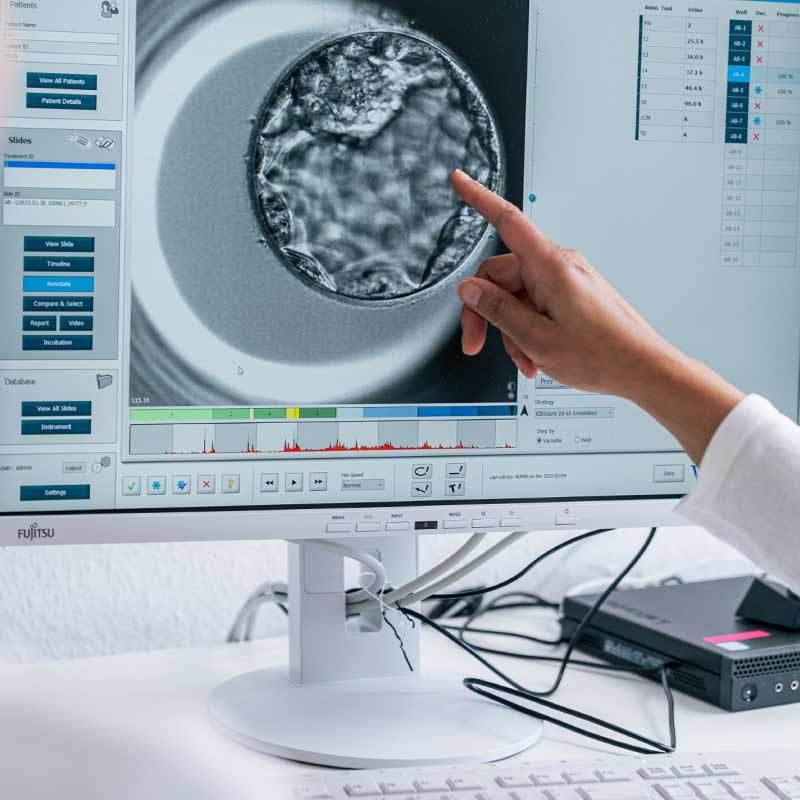
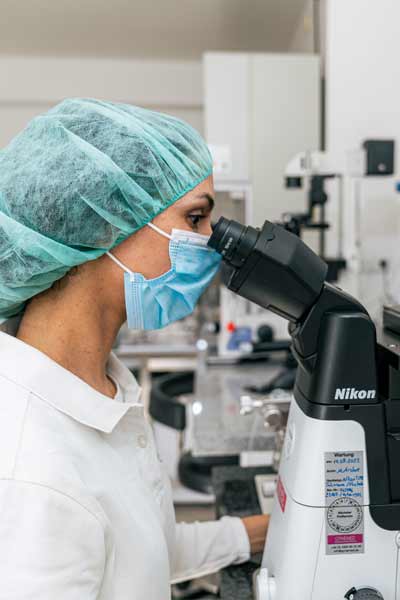
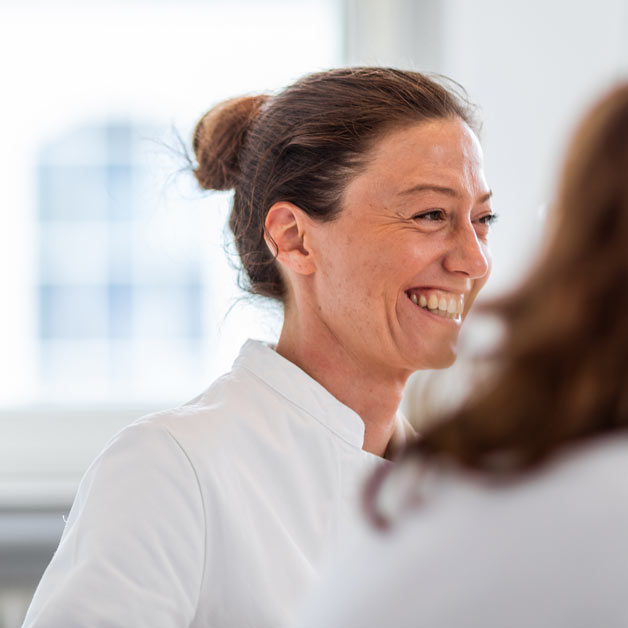
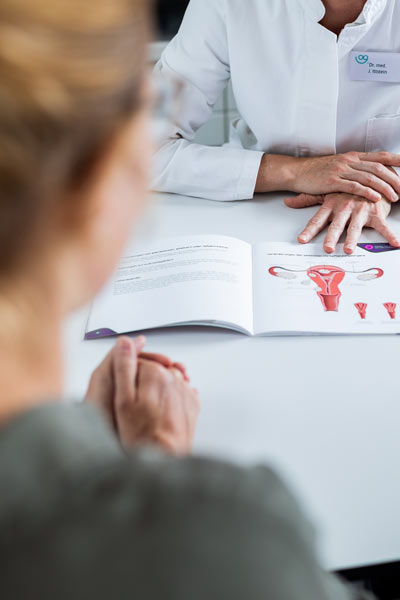
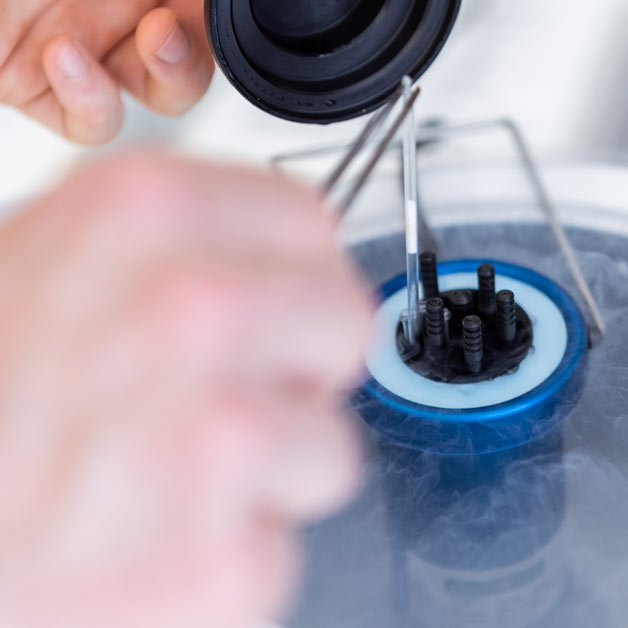
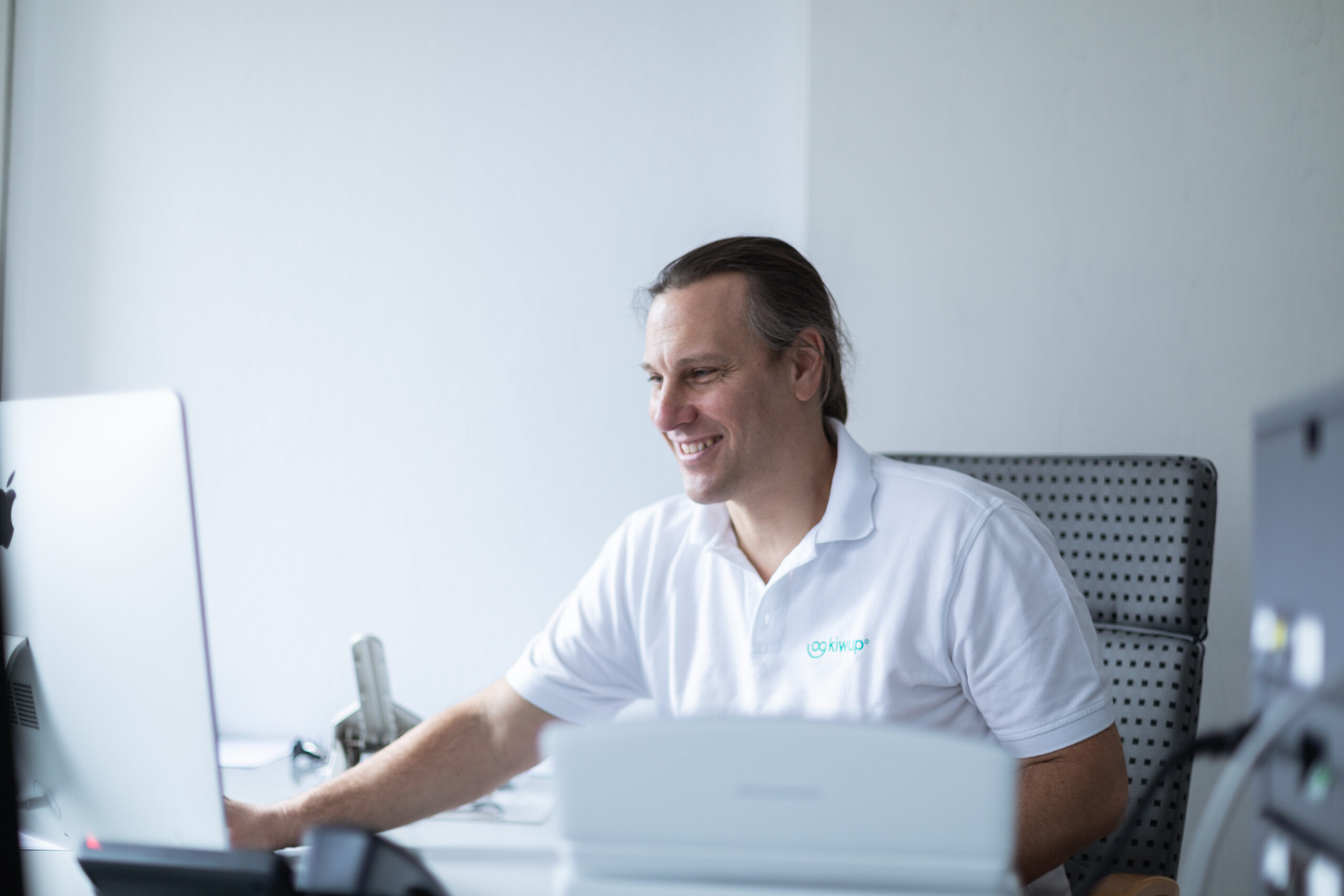
-
Ovarian Stimulation Therapy
The aim of ovarian stimulation therapy is to produce mature egg cells. With the help of a commonly well-tolerated hormonal treatment, we bring one to two egg cells to maturity. For two to three weeks, patients are required to take hormone tablets or injections that they can easily administer themselves or with the help of their partner. Once the hormone and ultrasound results show that the time is right, (usually around the 9th-13th day of treatment) we trigger final egg maturation and ovulation by means of a hormone injection. Now is the perfect time to have intercourse or schedule an intrauterine insemination treatment:
-
Intrauterine Insemination (IUI)
By means of intrauterine insemination, we reduce the distance that sperms have to travel to the fallopian tubes. At the time of ovulation, we insert prepared sperm cells of optimum quality, using a syringe and thin catheter, directly into the uterine cavity. From this position, it is easier for the sperm cells to swim into the fallopian tube and fertilize the egg cell. This form of insemination is used, for instance, in case of slightly deficient sperm cell quality or other problems that hinder the sperm from entering the uterine cavity.
German statutory health insurance providers cover 50 % of the treatment and drug costs for up to 3 cycles of insemination with hormonal stimulation; some health insurance providers even reimburse a part of or the entire remaining costs. In case of insemination without hormonal stimulation, 50 % of treatment and drug costs for up to 8 treatment cycles are covered. Both options are subject to the following conditions:
– the assumption of treatment costs applies only to married couples
– before the start of treatment, both spouses must be at least 25 years old
– the wife must be no older than 40, the husband no older than 50
– only the husband’s sperm cells may be usedIn addition, the wife must have antibodies against rubella and chickenpox or be vaccinated twice. We also recommend a vaccination against pertussis for both partners. A test for infectious diseases (HIV and hepatitis) is mandatory for both spouses.
These assisted reproduction therapies are also available to unmarried couples, of course. Usually they just have to bear the costs themselves. In case you are privately insured, we will draft an application to the insurance company for the assumption of costs before starting the treatment. As reimbursement of costs varies among insurance companies, especially regarding private insurance providers, you may want to check cost coverage with your provider – we are happy to assist you in this matter.
-
In-vitro Fertilization (IVF)
“IVF” is the joining of egg and sperm outside of the body. This method might be necessary in case the fallopian tubes are blocked, or the number of sperms is slightly reduced. Since the first “test-tube-baby“ was born in 1978, millions of children have been conceived this way. For this treatment, we stimulate the ovaries with hormone injections to bring several egg cells to maturity. After inducing ovulation, we extract the egg cells just before ovulation under brief anesthesia with a thin puncturing needle through the vagina. Subsequently, the egg cell and the male partner’s sperm are brought together in a nutrient solution, where the egg cell is fertilized in a natural way even though this process takes place outside of the body.
German statutory health insurance providers cover 50% of the costs for 3 IVF treatment cycles – some health insurance providers even reimburse a part of or the entire remaining costs – under the following conditions:
– the assumption of treatment costs applies only to married couples
– before the start of treatment, both spouses must be at least 25 years old
– the wife must be no older than 40, the husband no older than 50
– only ovum and sperm cells of the spouses may be used
– before the start of treatment, an IVF treatment plan (which we will provide you) must have been submitted to the health insurance company for approval
– additional counselling for the spouses concerning the treatment by a physician not involved in carrying out the treatment (e.g. certificate of advice from your gynecologist)Should you be privately insured or have a mixed insurance model (one partner with statutory health insurance, the other with private health insurance) we are happy to assist you with organizing the assumption of costs by your health insurance provider.
-
Sperm injection (ICSI)
An ICSI – also known as microinjection – mimics the natural process in which the sperm penetrates the egg. For this method, the sperm is not added to the egg in a petri dish, as in conventional IVF treatment, but injected directly into the egg cell. This method is recommended in case of highly reduced sperm quality (Oligoasthenoteratozoospermia). We fixate the egg cell under a special microscope using a holding pipette to then inject a single sperm cell with a thin injection pipette. As in IVF treatment, the transfer of the fertilized egg into the womb takes place two or three days later.
German statutory health insurance providers cover 50% of the costs for 3 ICSI treatment cycles – some health insurance providers even reimburse a part of or the entire remaining costs – under the following conditions:
– the assumption of treatment costs applies only to married couples
– before the start of treatment, both spouses must be at least 25 years old
– the wife must be no older than 40, the husband no older than 50
– you should be in possession of two spermiograms, taken a couple of weeks apart, which must meet specific criteria (should you choose to have the treatment conducted by us, we can complete the spermiogram beforehand)
– it is mandatory to have a physical examination by an andrologistWe also recommend genetic counselling and, where appropriate, a chromosomal analysis before starting the treatment.
For privately insured couples or couples with a mixed insurance model (one partner with statutory health insurance, the other with private health insurance), other coverage regulations apply. We are happy to assist you with organizing the assumption of costs by your health insurance provider. Irrespective thereof, our initial consultation and large part of the early diagnosis are free of charge.
-
Testicular Sperm Extraction (TESE)
If the patient’s ejaculate shows no sperm – e.g. sterilized men who decide they want to have a child after all, but for whom restoration of fertility was unsuccessful, or in case the patient had undescended testicles as a child – they can opt for having a small bit of testicular tissue removed in a surgical procedure (TESE), extracting active sperms which can be used for a fertility treatment. Before starting the procedure, we analyze the hormones in the male partner’s blood. If the TESE shows sperm in the testicular tissue, we freeze the tissue (cryopreservation) divided into several samples, so-called straws, for several attempts. This procedure is followed by artificial insemination in form of an ICSI treatment. As we work door-to-door with the andrology team of Urologie Bonn-Rhein-Sieg – Dr. Lossin, Carolin Jacobs, and Dr. Latz – we are able to offer patients a fresh TESE treatment, scheduling the testicular biopsy on the same day we collect the female partner’s eggs. This offers the advantage that the sperm can be injected into the egg cell before cryopreservation, increasing the chances of fertilization. The surplus of fertilized egg cell and testicular tissue is then frozen.
Most health insurance companies contribute to operative procedures for obtaining sperm cells. Freezing and storage costs must be borne by the patients themselves. Should you need assistance in this matter, we are happy to advise you.
-
FertiPROTEKT
FertiPROTEKT Netzwerk e.V. is a network of German, Austrian, and Swiss institutions involved in fertility preservation using methods to protect a patient’s fertility before germ cell-damaging treatments. Radiotherapy or chemotherapy can reduce fertility or even cause infertility. To preserve our patients’ fertility, we perform treatments such as freezing egg cells, sperm cells, or testicular tissue (cryopreservation). Other germ cell preserving procedures include collection, transfer, and cryopreservation of ovary tissue, or drugs that temporarily prevent the release of hormones which stimulate oocyte maturation and hormone production in the ovaries. (GnRH agonists, ovarian protection). Stimulation and cryopreservation of egg and sperm cells is conducted at our clinic, the surgical removal of ovarian tissue at University Hospital Bonn or University Hospital Cologne. Feel free to consult us should you have any further questions.
According to the German Social Code, patients have a claim to the assumption of costs by their health insurance provider for the cryopreservation of egg and sperm cells, or germ cell tissue, including the associated medical treatments, should they have to undergo a medically necessary germ cell-damaging treatment. We are
-
Social Freezing
A woman’s fertility is mostly determined by the vitality of her egg cells which in turn is closely related to her age. Due to modern freezing techniques (cryopreservation), unfertilized egg cells can now be stored for a later planned pregnancy, preserving the egg cells from aging while fully maintaining their quality. The prerequisite for this is that preservation takes place as early as possible. Biologically speaking, egg cell quality is best between the age of 18-25, with the highest chance of producing a viable embryo after fertilization. Egg freezing is possible even at a higher age, albeit the chances of pregnancy are somewhat lower.
The costs of social freezing are not covered by statutory or private health insurance companies. The costs depend on the number of stimulation cycles and the required drugs. We are happy to answer your questions in a first consultation.
-
Miscarriage (spontaneous abortion)
A miscarriage, also known as spontaneous abortion, is unwanted pregnancy loss that can have many causes. In case of recurrent miscarriage, that is 3 or more consecutive failed pregnancies with the same partner, you should consult a specialist for a closer examination to prevent further miscarriages. We will gladly explain the most common causes and conduct examinations to find the cause for your miscarriages. In some cases, the problem can be solved with a surgical procedure or drug treatment.
-
Spermiogram
Are you trying to find out why you are not getting pregnant, or are you just curious about your fertility? A spermiogram can provide the answer. If you want to hand in a sperm sample for analysis, you should first abstain from intercourse for a few days. You can collect the sperm sample on our premises. It will then be analyzed and we will explain to you the result in a personal consultation or by telephone. To receive a therapy recommendation during the initial consultation, we recommend submitting a sample beforehand.
To schedule a spermiogram call us at 0228-35 03 910.
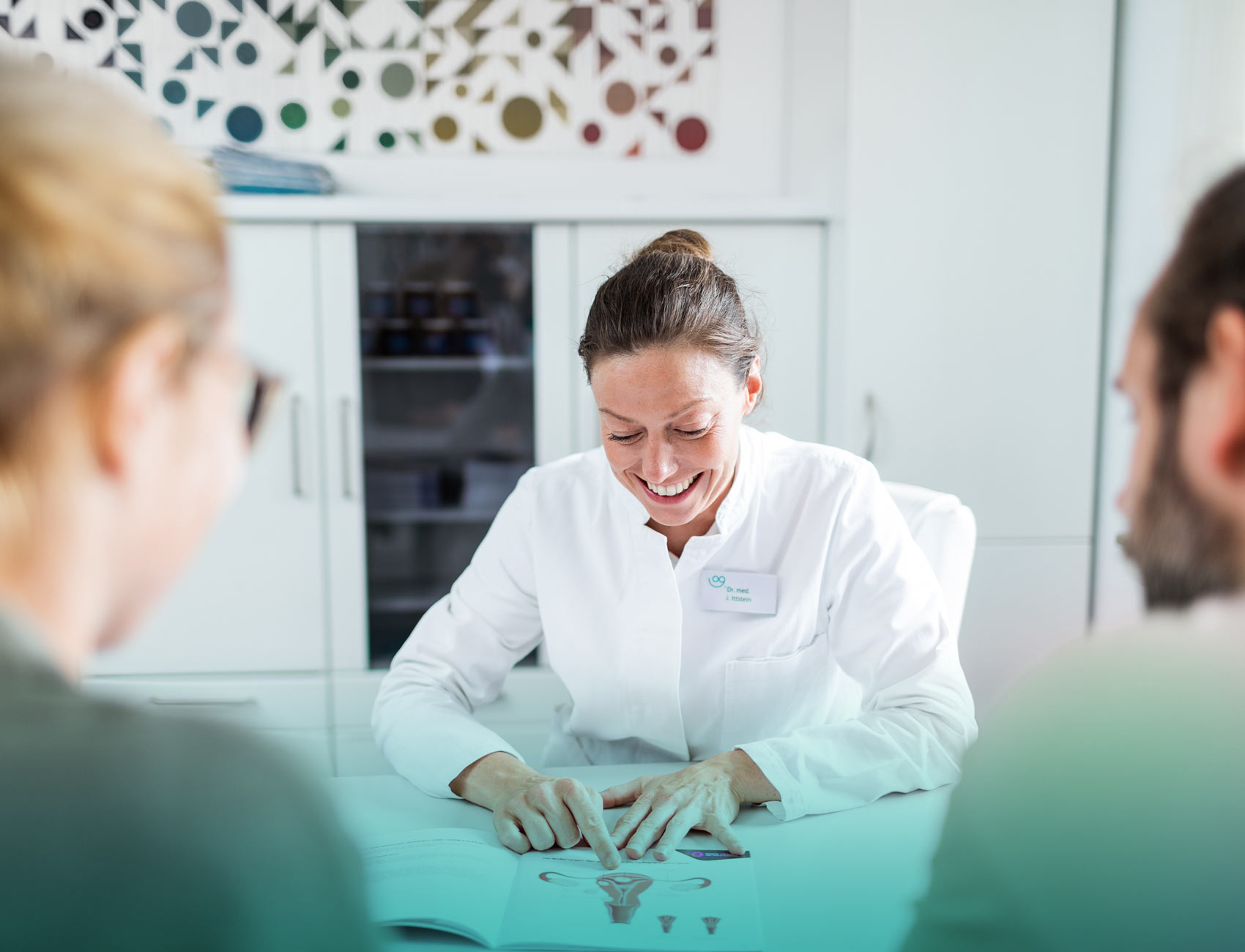
Information Evenings. —
A desire to have children can be a challenge. We gladly accept it. The path to a desired child is characterized by trust. In an initial consultation, we get to know each other. Here you can ask all the questions that are on your mind. We look forward to meeting you for an initial consultation.
